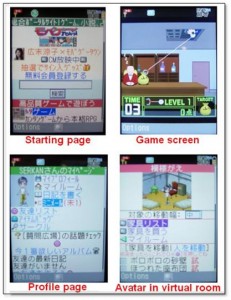The project workshop was held on August 20th at Roskilde University. At the meeting Sisse Siggaard Jensen gave a short report of recent project activities. She also presented some of the new directions in which the project is heading in this fall. Ph.d. student Ates Gürsimsek related the design process of Metrotopia and went into detail about the different areas of the virtual city, the design ideas, considerations and discussions behind these SL locations. Post Doc Carrie Reinhard reported from her media reception experiments and offered some preliminary analyses based on this extensive data material. Continued…
Posted in Blog, Workshops and Seminars.
Tagged with animation and game production, design, innovation, Metrotopia, OpenSim, Second Life, sense-making strategies, user-driven innovation, virtual city, workshop.
By dixi
– 2009/09/07
The Danish Agency for Science, Technology and Innovation – funding the Virtual Worlds Research Project – is hosting an open conference about Denmark’s future potential as a creative and innovative society. The conference will join together strategic research projects, report on work-in-progress and preliminary results, and highlight the outcomes of collaborative relationships between research and industry.
Head of research project Professor Sisse Siggaard Jensen has been invited as key note speaker and several of the Virtual Worlds subprojects will be presented in the afternoon poster session. See the full program here.
Posted in Blog, Conferences.
Tagged with collaborative relationships, conference, innovation, strategic research.
By dixi
– 2009/09/02
This is the abstract of the article: Remediating education in virtual worlds; it has been submitted to the Journal of Educational Research Special Issue on virtual worlds.
It is work-in-progress 
Posted in Blog, Publications.
Tagged with education, remediation.
By sisse
– 2009/09/01
 Virtual worlds have since its imprint on the global mindset evolved with great speed and diversity across platforms. The mobile platform in particular has reached hardware performance levels close to older low end laptops, enabling them as a serious contender for a Cambrian explosion of applications and in its wake leaving the iPhone trailing. Though, many barriers within the network, service and content providers still needs refinement to truly create an immersive and intuitive user experience, such an explosion of applications will also drive mobile virtual worlds into the mainstream where pioneers like Mini Friday (Habbo Hotel research project) and highly successful Japanese mobile only social network / virtual world Mobage Town with 15 billion page views in June (2008) will shoot like from the sky in Europe and North America.
Virtual worlds have since its imprint on the global mindset evolved with great speed and diversity across platforms. The mobile platform in particular has reached hardware performance levels close to older low end laptops, enabling them as a serious contender for a Cambrian explosion of applications and in its wake leaving the iPhone trailing. Though, many barriers within the network, service and content providers still needs refinement to truly create an immersive and intuitive user experience, such an explosion of applications will also drive mobile virtual worlds into the mainstream where pioneers like Mini Friday (Habbo Hotel research project) and highly successful Japanese mobile only social network / virtual world Mobage Town with 15 billion page views in June (2008) will shoot like from the sky in Europe and North America.
In case of Mobage Town, its business model accommodate both advertising and real money trade with virtual and physical items in stores (and its Japan so linking the digital with the physical is done via QR codes!). As a national continuation of Mobage Town’s real money trade, the controversy of mobile payment and premium SMS’s has really taken off today, here and here, as two Danish preteen girls on separate occasions have amassed huge phone bills (300 USD & 1.200 USD), spent on virtual items for their virtual horses.
The trend of mobile virtual worlds soon reaching a mainstream audience with all its mobile user interactions of inworld activity or contextually outworld feedback to friends only immersed on a PC will establish ground for new areas of study such as physical social networks, location-based avatar interaction and location-based payment schemes related to mobile virtual worlds.
Posted by Peder Burgaard, Innovation Lab
Posted in Blog.
Tagged with business, mobile virtual worlds, Platforms.
By dixi
– 2009/08/31
Registration deadline for the PhD Seminar: Analytical strategies and methodologies for the study of virtual worlds has been extended to September 10th 2009. To register send a one-page paper abstract along with this registration form.
Posted in Blog, Teaching.
By dixi
– 2009/08/31
The article explores how knowledge is produced collectively by the participants in the collaborative research process in the Virtual Worlds Research Project. It is due to appear in print in the journal, Public Understanding of Science and has now been published online (OnlineFirst) on the journal website – for the link, click here.
Posted in Blog, Publications.
Tagged with collaborative research, knowledge production.
By louisep
– 2009/08/31




Recent Comments